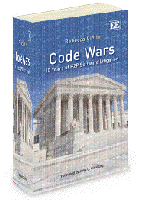Code Wars: 10 years of P2P Software Litigation, by Rebecca Giblin, is reviewed here for the 12709 Blog by
Stavroula Karapapa, Lecturer in Law at Brunel University. This is what she has to say:
"Over the past ten years or so, P2P file-sharing represents one of the main challenges to copyright law and an area which has attracted intense scholarly attention. Rebecca Giblin's book represents a significant addition to this growing body of literature by providing a legal and technological account of the first decade of P2P legal discourse. The book takes off from the proposition that despite the attempts to combat file-sharing via litigation and legislation, and in spite of the legal successes from the right-holders’ front, the phenomenon of file-sharing persists.
What clearly emerges from Giblin’s account of the so-called “Code Wars” is a rigorous insight of the inefficiencies of the current copyright norms in dealing with file-sharing technologies. Giblin identifies three such inefficiencies. First, technology progresses with its own logic and shapes its own law, which in Giblin’s words is an “anti-regulatory code”. Secondly, the software industry follows its own rules: most file-sharing software development lacks a profit motivation and, in this light, the principles that govern the hardcopy world cannot fully apply in the online context. Finally, the mentality of “sharing” is very widespread amongst file-sharing software innovators, who do not wish to enhance security against copying of their software.
Based on her convincing diagnosis of the fundamental differences between the hardcopy and online worlds, Giblin puts aside the so-called “physical work assumptions” and lays down clear insights on possible ways of improving laws dealing with the liability of P2P software providers. Building upon the proposals set forth by Peter Menell and David Nimmer, Giblin's principal suggestion is to extend the tort law standard of “reasonable alternative design” to cases of P2P liability and, in the final chapter of her book, she actually develops a test that could apply to such cases. Promising, yet feasible, the application of this test in file-sharing cases could show the way forward".
Full details of this book can be found on its web page
here.

No comments:
Post a Comment